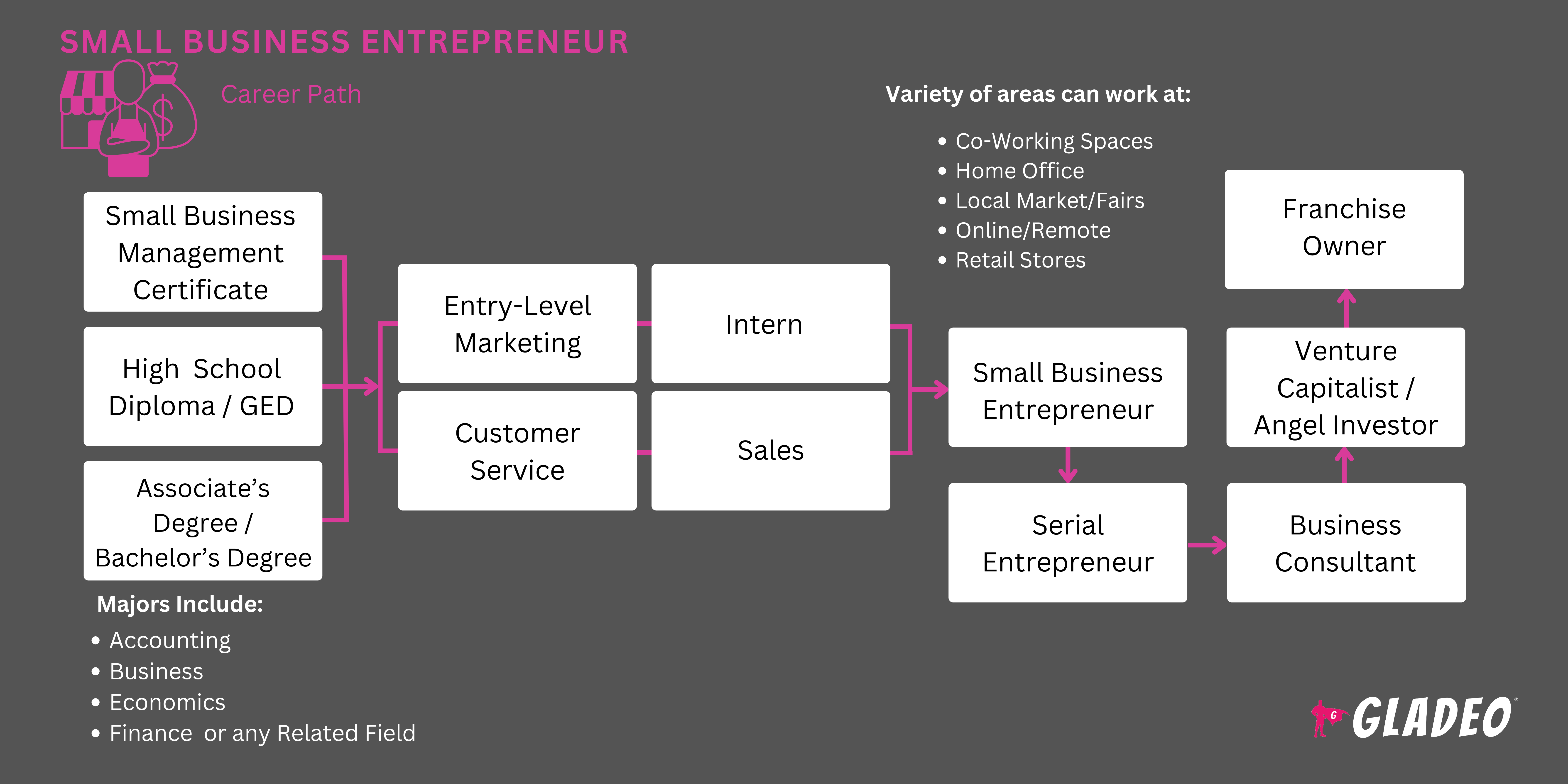스포트라이트
Startup Founder, Business Owner, Self-Employed Entrepreneur, Small Business Manager, Sole Proprietor, Microbusiness Owner, Independent Business Operator, Small Business CEO, Small Business Director, Small Business Consultant, Consultant
A growing number of Americans are launching their own business so they can be their own boss. There are currently 31 million entrepreneurs in the U.S., roughly ~16% of the population – and the number of new business formations is booming! Most of these are enterprises started by Small Business Entrepreneurs willing to risk financial uncertainty to pursue building a profitable business. They immerse themselves in the industries they aim to enter and work to develop the expertise needed to succeed.
Entrepreneurs must learn many skills to run a business, such as doing market research, finding the right price points, and effectively advertising their business to target consumers. They usually take out loans to fund their ventures, with amounts ranging from a few thousand dollars to half a million or more.
It can take years of perseverance just to break even, during which time many businesses struggle to make ends meet. To succeed in today’s competitive markets, it’s crucial to do in-depth research ahead of time and create a detailed, long-term business plan. The entrepreneurs who “make it” are the ones who do the most preparation!
- Satisfaction from building and growing a successful business
- Establishing connections with customers and communities
- Freedom to make decisions and drive your own future
- Creating something that can be passed on to family members
근무 일정
- Small Business Entrepreneurs typically work at least full-time and may need to put in longer hours during the initial stages. They may work from offices, co-working spaces, or remotely.
일반적인 업무
- Research markets and develop products or services that will attract customers.
- Develop a comprehensive business plan outlining the company’s mission, vision, budgets, financial projections and goals, target markets, competitor analysis, and marketing strategies.
- Lease or purchase a suitable space where the company can operate, meet customers, display merchandise, etc. Contact the town or city’s zoning department to ensure the space is approved for selling, if applicable.
- Secure funding through loans, investors, personal savings, and revenue generation.
- Procure the necessary licenses to run a business in your state.
Have offices and stores set up with furniture, shelving, desks, chairs, computers, and other necessary equipment. - Design and customize the interior and exterior spaces to be conducive to the type of establishment you’re opening.
- Develop a branding strategy to include a catchy company name, logo, communication guidelines, color schemes, etc. Order signs, branded apparel, stationary, and other items that display the brand name and logo.
Carefully recruit, train, and lead a motivated team of employees, contractors, and/or freelancers. - Work with vendors and suppliers to source goods and services.
- Note, per Tradogram, “a supplier, like a farmer, provides raw materials, goods, or services to another company, often for manufacturing purposes. In contrast, a vendor is a business entity that sells finished goods or services directly to consumers or businesses, similar to a general store owner.”
- Manage or delegate human resources and accounting tasks such as employee relations, payroll, taxes, etc.
- Develop and implement marketing and pricing strategies to promote products or services.
- Create a website and e-commerce store, if suitable. Hire a market research consultant, website developer, SEO specialist, email marketer, copywriter, graphic designer, public relations expert or spokesperson, video producer, and/or social media expert, as needed.
- Establish quarterly revenue goals and help sales teams meet targets.
- Execute strategic plans for introducing new products or services and for business growth.
- Oversee daily operations, ensuring efficient processes, quality control, inventory management, procurement, production, service delivery, etc.
- Collaborate with stakeholders, suppliers, vendors, partners, industry associations, and regulatory bodies.
- Build and maintain customer relationships. Provide excellent service, address questions and concerns, and gather feedback for improvement.
추가 책임
- Comply with local, state, and international laws, regulations, and guidelines.
- Mitigate legal, financial, and operational risks.
- Measure the impact of initiatives and return on investment.
- Keep up with industry trends, technological advancements, and changes to the overall business landscape.
- Look for opportunities to partner with other businesses.
소프트 스킬
- 적응성
- 디테일에 대한 관심
- Budget-conscious
- Collaborative
- 커뮤니케이션
- Confidence
- 창의성
- Customer service
- Decisiveness
- 세부 사항 중심
- Flexibility
- 리더십
- 멀티태스킹
- Organizational skills
- Persistence
- Persuasiveness
- 문제 해결
- Resilience
- Strategic thinking
- 팀워크
- 시간 관리
기술 능력
- Branding, marketing, and public relations
- Business development and management
- Financial management, budgeting, and payroll
- Human resource management
- Knowledge of relevant legal and regulatory frameworks
- 프로젝트 관리
- Return on investment principles
- Sales
- Small business enterprises, such as:
- Retail stores
- Food and beverage establishments
- Service providers (e.g., salons, repair shops)
- E-commerce businesses
- Specialty shops or boutiques
Small Business Entrepreneurs need a ton of commitment to get through the early phases of business development, launch, and the first few years of seeking profitability. They work long hours and may fill many roles within their business. Solopreneurs may work entirely alone, doing everything themselves.
Financial risk is inherent, and entrepreneurs must constantly navigate issues like maintaining positive cash flow and dealing with competition. Businesses opening in already-crowded markets face an uphill battle unless they have a unique value proposition and can distinguish themselves from others in the same industry. That’s why entrepreneurs must do diligent research and conduct meticulous planning before starting any new venture.
While the challenges can be daunting, Small Business Entrepreneurs are usually driven by the desire to be their own boss and make their own decisions while creating something meaningful and profitable!
Technology is transforming the business landscape for everyone, with e-commerce platforms, customer relationship management systems, and social media marketing now being essential for success. These tools are relatively affordable and accessible to any business owner, but it’s hard to compete with large businesses and franchises that have massive budgets, streamlined supply chains, and established customer bases.
For example, in 2023, Amazon and Walmart accounted for 17% of U.S. retail sales, counting both online and physical sales. That’s just two corporations controlling nearly one-fifth of America’s entire retail market. This doesn’t mean small businesses can’t thrive in today’s economy – but they may have to get creative if there’s a chain store in the area selling similar products or if e-commerce shops sell the same things for less money and with fast, free shipping.
One ray of light is the fact that modern customers value customer service and personalized attention. They also like doing business with companies that share their values. That’s why sustainability, eco-friendly products and services, and fair trade practices often help distinguish small businesses from large companies. “Buying local” is another popular marketing strategy, used by many businesses facing stiff competition from big box stores like Costco and Target.
Small Business Entrepreneurs often enjoyed hands-on projects and creative problem-solving in their younger years. They might have been involved in activities like organizing events, selling products, or leading group projects, showing an early interest in leadership and enterprise.
- There is no established educational path for entrepreneurs. Some learn by trial and error, while others take a few business classes. Many go on to earn a bachelor’s degree in business, economics, finance, or a subject related to whatever industry their business is in.
- A strong business foundation is essential to avoid mistakes that could cause a business to fail. Relevant courses include:
- Accounting, Finance, and Budgeting
- Business Ethics
- Community Engagement and Outreach
- Conflict Resolution and Negotiation
- Human Resource Management
- Marketing and Sales
- Networking and Partnership Development
- Strategic Planning
- Entrepreneurs can find many valuable courses on sites like edX, Coursera, Udemy, LinkedIn Learning, Harvard Business School Online, and many others. It’s also helpful to learn how to use analytical programs such as HubSpot, Sprout Small Business, Google Analytics, and Tapinfluence.
- For those who want to hire employees, you’ll need to study and comply with several federal, state, and local laws. Common tasks include:
- Getting an Employer Identification Number and registering with the labor department
- Buying worker’s comp insurance and establishing worker benefits
Establishing payroll and tax withholdings - Ensuring fair hiring practices and safe working conditions
- Maintaining the security and privacy of personnel records
- Certifications can also be helpful, though they are completely optional. Popular certifications include:
- SBA - 8(a) Business Development Certification
- NASBITE International - Certified Global Business Professional
- 프로젝트 관리 연구소 - 프로젝트 관리 전문가
- There are no specific educational requirements for Small Business Entrepreneurs, but a degree in business, economics, or finance may contribute to a successful venture.
- Look for programs offering opportunities for internships or other hands-on experience.
- Check out the program’s faculty and their experience in small business ventures.
- Other considerations include:
- Costs of tuition and any discount or scholarship options.
- Whether the program qualifies for federal aid tuition payments.
- Whether you want to attend on-campus, online, or via a hybrid method.
- Graduate job placement stats and details about the program’s alumni network.
- Entrepreneurs can benefit from taking English, speech, debate, math, accounting, finance, marketing, business, graphic design, and social media marketing.
- Volunteer for activities where you can learn project management, leadership and teamwork, and conflict resolution.
- Seek internships or try freelancing.
- Learn to use software programs for financial management, client relationship management, workflow automation, file sharing, and risk assessment.
- Become an expert in the product or service you want to offer.
Study the markets and decide if you want to run a local, statewide, national, or international business. Pay attention to business licensure and tax requirements. - Decide if you want to launch a small business or startup.
- Small businesses focus on steady, local growth with low risk.
- Startups aim for rapid, scalable expansion with high risk and innovation.
- Talk to a business lawyer or risk management consultant to discuss liabilities and ways to reduce exposure to risk and lawsuits. Also meet with an insurance agent to review options such as:
- General Liability Insurance
- Property Insurance
- Professional Liability Insurance (Errors & Omissions)
- Workers’ Compensation Insurance
- Business Interruption Insurance
- Commercial Auto Insurance
- Cyber Liability Insurance
- Product Liability Insurance
- Business Owner’s Policy (BOP)
- Launch a website and establish your social media presence. Study SEO, Search Engine Marketing, and analytic tools.
- Ask successful Small Business Entrepreneurs for advice or mentorship. If you’re in college, scan through your alumni network to see if there are potential connections. Look for programs that offer help with establishing your startup, such as accelerator programs.
- Grow your LinkedIn influence by writing and sharing articles. Be mindful of public perception as you hone your brand’s image and reputation.
- Hop on LinkedIn, Quora, Reddit, or other forums to ask job advice questions to other business professionals.
- Join professional organizations to learn about trends and grow your network.

- Since Small Business Entrepreneurs are self-employed, there isn’t a job to land, per se. You’ll be your own boss, so be ready to put in the hours to develop a rock-solid business plan that lenders or investors can get behind.
- It can take months or years to be successful at a small business or startup enterprise, so have a plan to pay bills as you progress.
- Review Small Business Administration resources. Veterans should visit the SBA’s Veteran-owned business section. Also learn about angel investors and venture capitalists.
- Check out government grants and other small business grants that may be available. Grants don’t have to be paid back, but they come with strict conditions about how funds can be used.
- If needed, get some job experience before launching your enterprise. Look for internships, volunteer opportunities, or entry-level positions via sites like Indeed, Idealist, Devex, and LinkedIn. Business internships are a great way to get experience before launching your own enterprise!
- Connect with your school’s career center for resources and support.
- Grow your business and your team methodically and strategically. Have a business plan but also create a roadmap outlining milestones and timelines for achieving them.
- Don’t try to reinvent the wheel. Talk to experienced entrepreneurs and listen to their advice.
- Read books and take continuing education courses to learn how to stay ahead. Consider doing an MBA if it’ll help you master certain aspects of your business.
- Try to anticipate potential problems, but never panic when unexpected issues arise. Stay calm and look for feasible solutions. Reach out to others for assistance.
- Keep an eye on how your products and services are selling. Stay flexible so you can make improvements or changes, as needed.
- Attend events where you can raise awareness of your brand. Look for creative opportunities to partner with other brands.
- Keep learning new ways to use social media platforms to promote your business, engage with customers, and grow your online presence.
- Stay informed about industry trends and market changes. Adapt your business strategies to align with evolving customer preferences and technological advancements.
- Offer training and development opportunities for your team to boost their performance. Keep them motivated with good benefits, and employee wellness programs.
웹 사이트
- AllBusiness
- AngelList Venture
- BizSugar
- Bplans
- Business2Community
- Business Insider
- Clarity.fm
- Duct Tape Marketing
- Entrepreneur.com
- Fast Company
- Forbes
- For Entrepreneurs
- Harvard Business Review
- HubSpot
- Inc. Magazine
- Investopedia
- MarketingProfs
- Mashable
- Neil Patel
- NerdWallet
- School for Small Business Entrepreneurs
- SCORE.org
- Seth’s Blog
- Shopify Blog
- Small Business Administration
- Small Business Trends
- TechCrunch
- The Balance
- U.S. Chamber of Commerce
- Under30 CEO
- VentureBlog
- Wise Bread
- Y Combinator
도서
- Profit First: Transform Your Business from a Cash-Eating Monster to a Money-Making Machine, by Mike Michalowicz
- Starting a Business All-in-One For Dummies, by Eric Tyson and Bob Nelson
- The Home-Based Business Guide to Write Off Almost Anything: You'll Keep More Money Once You Know These Tax Secrets, by Doug Collins
- The Only LLC Beginners Guide You’ll Ever Need, by Garrett Monroe
Small Business Entrepreneurs juggle a ton of tasks and responsibilities but their hard work doesn’t always result in a successful business. For those interested in alternative career paths, consider our list below!
- Advertising Manager
- Business Consultant
- E-commerce Specialist
- Financial Manager
- Fundraiser
- Marketing Manager
- Operations Manager
- Product Manager
- Public Relations
- Sales Manager
- Supply Chain Manager
뉴스피드

주요 채용 정보

온라인 강좌 및 도구









